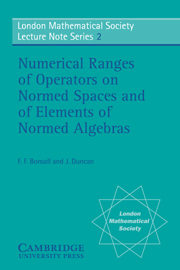CHAPTER 2 - Hermitian elements of a complex unital Banach algebra
Published online by Cambridge University Press: 05 June 2013
Summary
The elements of a complex unital normed algebra with real numerical range merit special attention. Such elements, called Hermitian elements, possess many of the properties of a self-adjoint element of a B*-algebra, and there is a close connection between the two concepts. This chapter provides a systematic account of the connection.
In §5 we give two useful characterizations of Hermitian elements in a complex unital Banach algebra and then derive some elementary properties of the set of all Hermitian elements. The main result (known as Vidav's lemma) is that the numerical range of a Hermitian element is the convex hull of its spectrum. Vidav's lemma appears to be one of the deeper results in the present theory and we present various applications. The discussion of Hermitian elements is continued in §6 to lead up to the Vidav-Palmer theorem which gives a characterization of unital B*-algebras as those complex unital Banach algebras A such that each a ∈ A is of the form a = h + ik with h, k Hermitian elements.
The Vidav-Palmer theorem is used in §7 to give various characterizations of B*-algebras and also to give simple proofs of some known results in the theory of B*-algebras. In §8 we present mild generalizations of the Vidav-Palmer theorem to the cases of incomplete and non-unital algebras. A characterization of A*-algebras is immediately deduced. Finally we discuss the existence of a maximal B*-subalgebra of an arbitrary complex unital Banach algebra.
- Type
- Chapter
- Information
- Publisher: Cambridge University PressPrint publication year: 1971



